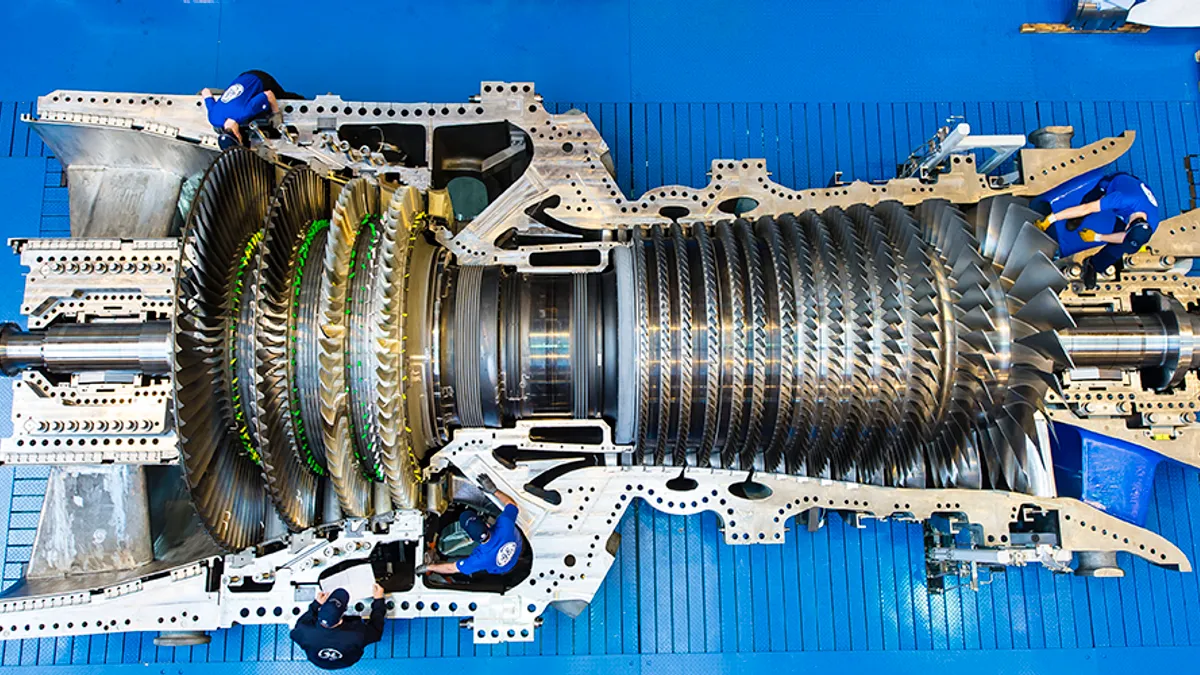Dive Brief:
-
General Electric sees hydrogen as the key to natural gas' participation in a 100% carbon-free electric grid, Brian Gutknecht, chief marketing officer of GE Power said on a panel Monday at the 2019 Edison Electric Institute conference,
-
"The gas turbines that we utilize today to burn normal natural gas are capable of, and have demonstrated, burning higher and higher percentages of hydrogen mixed in with natural gas," Gutknecht told Utility Dive after the panel. "As you do that, the carbon impact, it becomes less and less."
-
Carbon capture and sequestration has been central to the discussion over whether or how to include fossil fuel plants in a carbon-free future, but Gutknecht said GE is more focused on clean, efficient extraction and use of the resource than carbon capture and sequestration (CCS) technologies, which remain too expensive.
Dive Insight:
GE was accused of "badly" misjudging the clean energy transition by underestimating how quickly the transition to clean energy would come, costing investors an "almost unprecedented" $193 billion from 2015 to 2018 by investing aggressively in natural gas, according to a report released last week.
But what if the company's gas turbines, which it's invested so much in, could burn something other than gas that would contribute to the clean energy future?
And although "the economics of producing affordable hydrogen" are still not there, it's more of a focus for the company than CCS, according to Gutknecht.
"At this point, it's not economically viable to use carbon capture and sequestration at scale," he said. "But we do believe it could be, whether through a carbon tax or just recognizing that the cost of doing nothing on decarbonization comes with a very high price tag as well."
Hydrogen has been a tricky fuel for the energy sector to pin down. While the electricity it generates is carbon-free, the amount of power needed to split hydrogen from water often exceeds the amount of power it actually generates. But extraction technologies may be improving. New Brunswick Power and Hydrogen Energy company Joi Scientific said in March it is on the way to building the first hydrogen-powered grid in the world.
GE says its gas turbine technology, which has faced hurdles over the past year, may be key to hydrogen's future as it scales to market, and could exclusively run on hydrogen as the technologies and economics surrounding the resource mature.
"The same technologies that we offer in our gas turbines today could reach a point where they could burn 100% hydrogen in the future," said Gutknecht. "So at a point ... where the economics of producing affordable hydrogen are compelling, then the assets that our customers are buying today ... could be dual-purposed to basically provide zero carbon power."
But some on the panel said waiting for that economic maturity may be too late and there are more immediately viable options for transitioning to a cleaner grid.
"2050 may seem far away, but it's really not," said Environmental Defense Fund Senior Vice President Mark Brownstein, adding that he hopes to be on the beach by then, but "hopefully that beach isn't in Ohio."
Natural gas is viewed by many as a cleaner baseload alternative to coal, as more intermittent renewable resources continue to integrate onto the grid. But as battery storage technologies mature, they are becoming a stronger, zero emission competitor against natural gas, noted Brownstein.
But the problem with battery storage, noted Gutknecht, is that development has been focused on shorter duration, unlike natural gas, which can handle longer duration intermittencies.
But GE has been working to expand into the renewable energy and storage sectors as well: In January, the company announced it would restructure its business to merge its renewable energy assets, including solar, storage, wind and hydro. And GE officials now says its investment in natural gas does not take away from its focus on renewable energy.
"I think [gas and storage are] really complementary," Robert Morgan, CEO of Energy Storage at GE Renewable Energy told Utility Dive after a separate panel on storage. "We're hybridizing batteries with wind, with solar, with gas turbines. ... So the system actually is huge. And so there's a lot of room for growth and we're all about making that system operate more efficiently ... So I don't think it's an 'either, or,' it's definitely a 'both, and.'"















